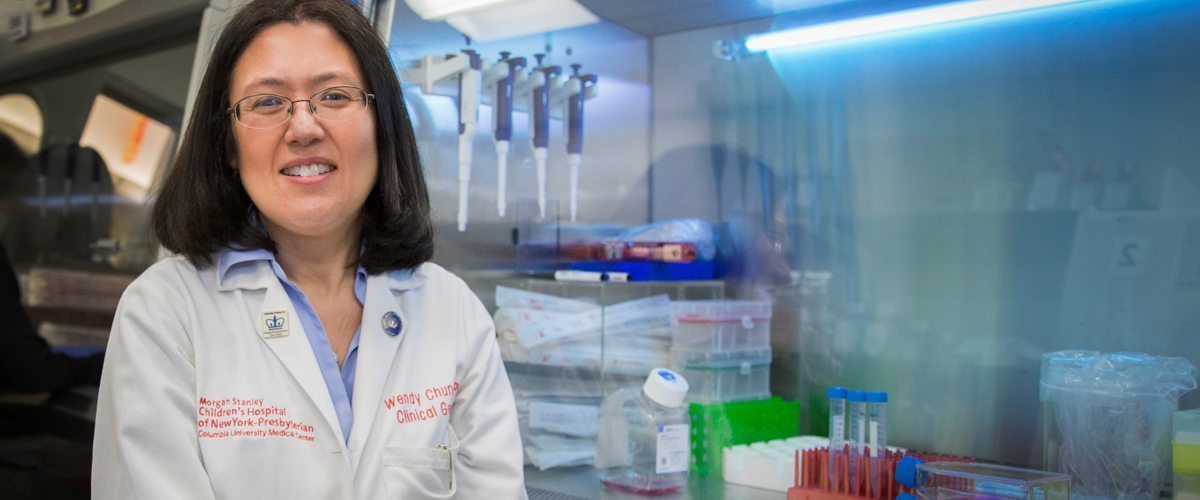Inside NYP: Dr. Wendy Chung
The clinical and molecular geneticist’s groundbreaking DISCOVER program is contributing to the diagnosis and treatment of rare diseases.

I’m a very logical and methodical person. As a kid, I was attracted to Encyclopedia Brown books, puzzles, and trying to be a detective. I like things that are solvable problems with definitive answers. And I knew early on that I wanted to be a physician scientist and that I liked genetics.
I grew up in Miami, came north for school, and never left. The year I started medical school at Cornell was the first year of the Human Genome Project (an international scientific research project that aimed to identify and map all the genes of the human genome), and my professors were complaining about [the U.S.] potentially spending billions of dollars on this, asking, “What is it going to do for us?” Because of the amount of money involved, I thought, Something is going to happen on this and it’s going to take awhile. … They’ve got a 20-year plan to complete the genome. I’ve got a 20-year training plan. We’ll both finish at the same time.
I really started the DISCOVER program (short for Diagnosis Initiative: Seeking Care and Opportunities with Vision for Exploration and Research) 25 years ago. The first gene that I cloned took six years. The last one took about 14 days because of our capacity to sequence cheaper, better, and faster. The idea of DISCOVER is that there are a lot of patients out there who are searching for a diagnosis and treatment. In some cases, they’ve been searching for years, and they need a diagnosis to be able to get on to treatment, especially if their disease isn’t yet described.
We use both our clinical expertise and our research enterprise to analyze a patient’s genome — all 20,000 of the person’s genes in terms of being able to do that on scale, pedal to the metal, completely and thoroughly like no one else in the world. If the reason for a disease is genetic, we will find it. I can’t tell you how long it will take, because for some patients, we find it in 14 days. In others, we find it a year after they’ve seen me, because we go back and look again. I’ve had patients whom I’ve been taking care of for 15 years, and we’re only now figuring out what’s wrong.
Children are the majority of the DISCOVER program’s patients because we know the least about children’s conditions. I think that’s where we’ve got the most to learn. Unfortunately, when a disease presents in childhood, it is often more serious than when it presents in adults. Many times, those kids don’t have treatments yet available, they don’t have places to turn. Their doctors don’t know what it is or, therefore, how to treat it. The disease is also more likely to be genetic in children.
Children often have parents who are very motivated and who are great partners for me. All of us would do anything for our kids, and the parents are trying to figure this out and, in some cases, they feel like there is a ticking clock. Fortunately, we’ve got a network of literally thousands of scientists around the world whom we can use. When I need to, I’ll phone a friend about a gene. If I don’t know the answer, they know the answer, and we start pushing the envelope.
I’ve discovered 41 diseases. Forty-one times I’ve had the first indexed patient — to our knowledge — meaning the first person in the world described with a new condition. For many of my patients, the journey doesn’t stop once you get a diagnosis. That’s only the beginning. I tell people, I’m your Sherpa. We’re scaling a mountain; we’re scaling Everest. I am here to guide you. I don’t know all the answers, you don’t know all the answers but, together, we are going to go on this journey into uncharted territory.
Dr. Wendy Chung is a board-certified clinical geneticist with a Ph.D. in molecular genetics. She received her M.D. from Cornell University and her Ph.D. from The Rockefeller University. She is director of the DISCOVER program at Columbia University Irving Medical Center and the Kennedy Family Professor of Pediatrics and Medicine at Columbia University Vagelos College of Physicians and Surgeons. She also leads the Precision Medicine Resource in the Irving Institute at Columbia University Irving Medical Center and serves on the Genomics Working Group and Pediatrics Advisory committee for the All of Us precision medicine initiative and on the Council for the National Human Genome Research Institute.
